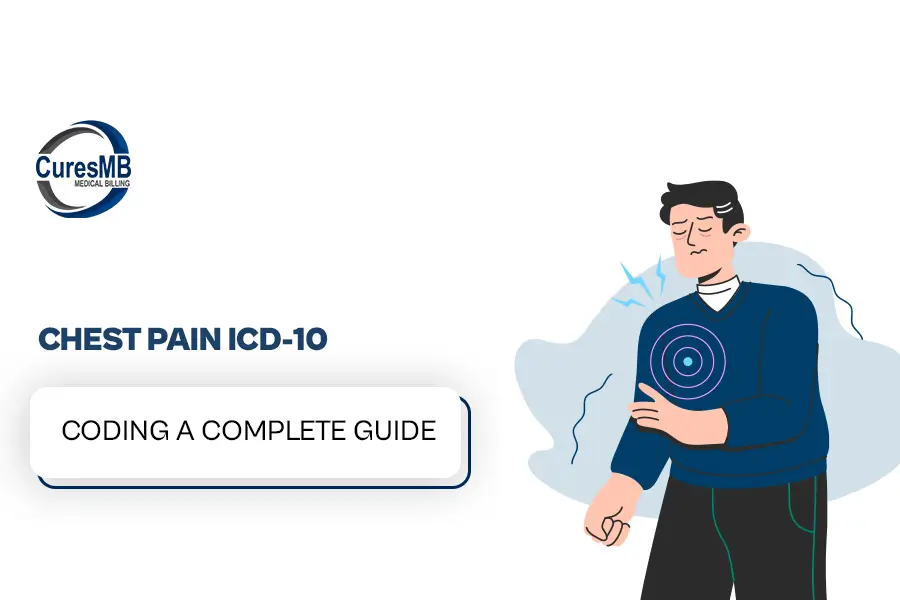
When it comes to medical billing, accurately coding chest pain can make the difference between clean claims and costly denials. Whether the pain is sharp, tight, substernal, or atypical, choosing the right ICD-10 code is critical for reimbursement, compliance, and clinical accuracy.
This guide walks you through ICD-10 code R07.9, related chest pain variations, and how to bill them correctly in 2025.
R07.9 is the ICD-10 code for unspecified chest pain, typically assigned when clinical documentation lacks detail about the exact nature or origin of the pain.
It’s often reported when a patient presents with chest pain, but the provider doesn’t specify if it’s substernal, pleuritic, or musculoskeletal. While it’s a valid code for billing, it should be used only when no better alternative exists.
Pro tip: If the provider provides more detail, avoid defaulting to R07.9. Instead, use a specific code to support medical necessity.
Not all chest pain is created equal, and neither are the codes. The R07 category includes multiple options depending on location, severity, and origin of pain.
Below is a list of frequently used ICD-10 codes related to various types of chest pain.
Symptom Type | ICD-10 Code | Description |
Chest pain, unspecified | R07.9 | General, non-specific chest pain |
Other chest pain | R07.89 | Includes tightness, discomfort, atypical |
R07.1 | Pain worsened by breathing | |
Substernal chest pain | R07.2 | Pain is located behind the sternum |
Intercostal (rib) pain | R07.82 | Pain sideways the ribs or the costal margin |
Each code represents a distinct type of pain and should be matched closely to the provider’s documentation.
Many coders confuse R07.9 (unspecified chest pain) with R07.89 (other chest pain). Here’s how to tell them apart:
Always default to R07.89 over R07.9 if even minor specificity is provided.
Billing for chest pain might sound simple, but it’s a common cause of denials due to:
Our goal is to streamline your healthcare revenue cycle management, give you the financial freedom your practice deserves, and take control with a partner specializing in provider RCM optimization and services excellence.
Fill out the form below and we’ll contact you shortly.
Here’s a consolidated reference table for common 2025 ICD-10 codes related to chest pain:
Code | Description |
R07.9 | Chest pain, unspecified |
R07.1 | Chest pain on breathing (Pleuritic) |
R07.2 | Precordial (substernal) chest pain |
R07.89 | Other chest pain (tightness, pressure) |
R07.82 | Intercostal pain (rib, side chest pain) |
M94.0 | Costochondritis (Chondrocostal junction) |
This helps coders and billers quickly select the right code based on the physician’s documentation.
No major changes to chest pain codes are expected in 2024, 2025. However, stay alert for CMS guideline revisions on linking codes to clinical criteria.
Coding chest pain might seem straightforward, but choosing the right ICD-10 code impacts claim success, reimbursement, and compliance. Although R07.9 is often reported, choosing a more precise code based on provider documentation improves billing accuracy and supports medical necessity.
For cleaner claims, train providers to document location, quality, and triggers of chest pain. And as always, pair your codes with strong clinical justification.
Need expert billing support?
Contact CuresMB to optimize your coding, reduce denials, and streamline revenue.
R07.9 is the most usually used, but it is should only be used when documentation is non-specific.
Use R07.2 if the provider clearly documents substernal or precordial pain.
Yes, but only if chest pain is a distinct symptom and not part of a more definitive diagnosis (like angina or GERD). Always follow payer-specific guidance.
Modifiers like 25 (separate E/M service) may apply if chest pain is addressed during a visit with other procedures. Avoid 59 unless distinct services are performed.
Yes, R07.89 is a valid and billable ICD-10 code used for “other chest pain” such as tightness, discomfort, or atypical sensations.
For rib trauma or Costochondritis, consider S22.3x (rib fracture) or M94.0 instead of the generic R07.x codes.
Discover Cures Medical Billing Services Across Different States
FL
NY
ML
CO
NJ
AZ
TX
CA
WA
We are a team of national medical billing service experts based in Astoria, NY, committed to providing ongoing value to our customers. We leverage technology and implement best practices to provide high-quality and cost-efficient medical billing solutions from domestic locations, enabling customers to achieve their business goals. Cures Medical Billing is the best option for any medical billing needs.
Medical billing around Astoria, NY, and beyond is our core competency and our specialists will efficiently manage all your billing needs. Our medical billing specialists have over 12 Plus years of experience with all security technologies to ensure data integrity for our customers. Using our medical billing service, anyone can make their medical billing task less resource-consuming.
Efficiency & precision in healthcare financial management with Cures Medical Billing, your trusted partner for smarter, faster, and more accurate billing solutions.
This site uses cookies. Read our Privacy Policy